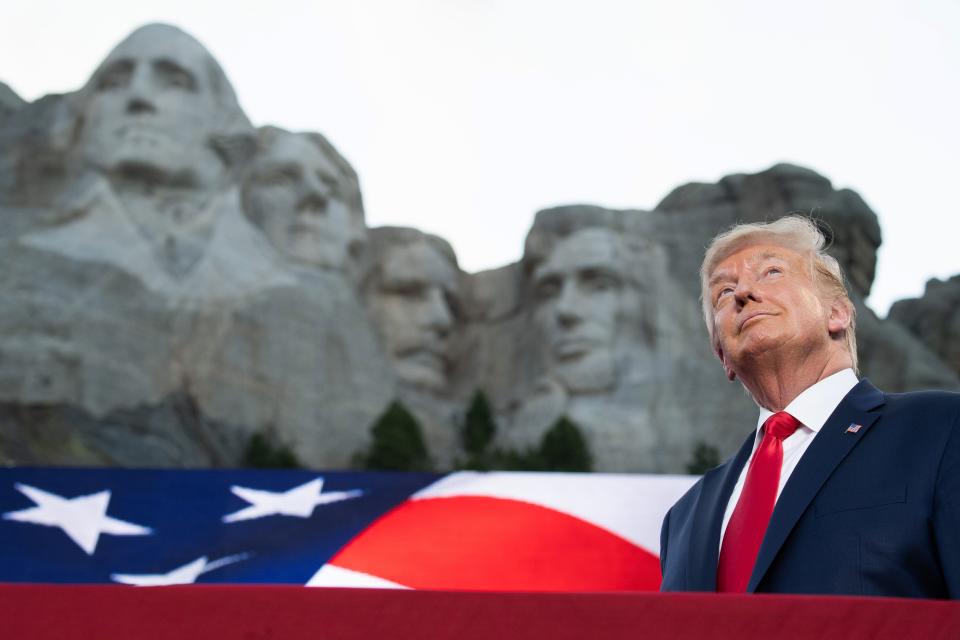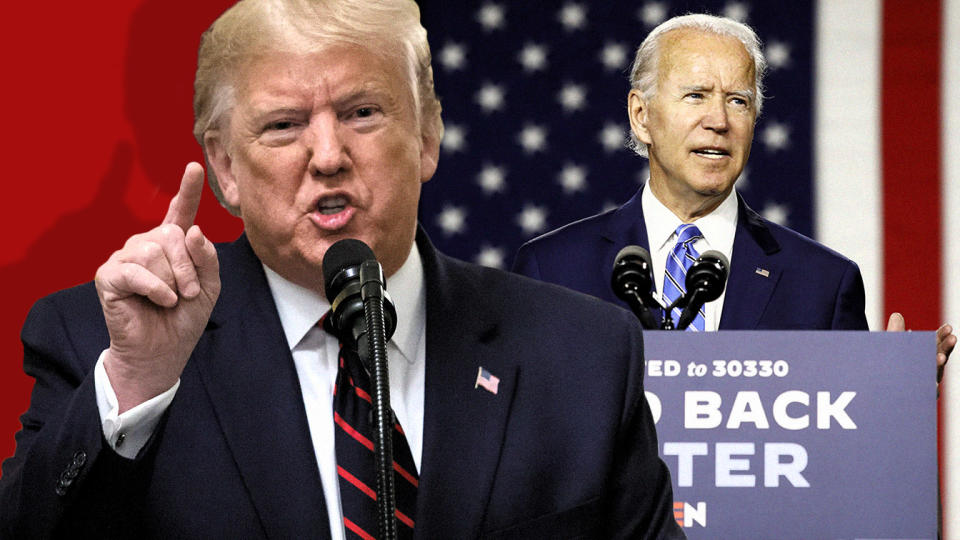New Yahoo News/YouGov poll: Trump's 'culture war' on Biden isn't winning voters to his side
With the coronavirus surging and the economy in tatters, President Trump seems to have decided that his surest path to reelection lies in portraying Joe Biden, his Democratic rival, as a “puppet of the militant left” who will allow “thugs” and “angry mobs” to “tear down” monuments to “our heritage” — including Confederate symbols and statues of early slaveholding presidents.
Trump’s latest campaign ad hits all these notes, claiming that “you won’t be safe in Joe Biden’s America” because “Biden stands with” the “radical left-wing mob.”
But a new Yahoo News/YouGov poll suggests the public isn’t buying it. Despite the president’s insistence on “law and order,” most voters (51 percent) say the country would become less safe if Trump wins in November. Just 39 percent say the same about Biden.
The survey, which was conducted between July 11 and July 14, did show that many Americans disagree with those who seek, for instance, to topple the equestrian statue of Andrew Jackson near the White House or rechristen U.S. Army bases that bear the names of Confederate generals.

By a 48 percent to 34 percent margin, Americans oppose removing statues of these generals from public property; a majority (52 percent to 32 percent) says their names should not be removed from bases either. Sixty-five percent, meanwhile, oppose removing statues of presidents such as Jackson, George Washington or Thomas Jefferson; only 18 percent support it. And Americans are divided — 42 percent yes, 43 percent no — over whether to remove the Confederate battle emblem from U.S. state flags, even though the Mississippi state Legislature recently voted to remove the last of these emblems.
The problem for Trump, however, is that few Americans associate Biden with this kind of activism. Just 40 percent, in fact, say the former vice president wants to tear down Confederate monuments. Even fewer — 30 percent — say he wants to remove statues of slaveholding presidents. (Biden has said that public statues of presidents should be preserved, while monuments to Confederate leaders should be removed peacefully by local officials.) And most Americans (52 percent) disagree with Trump’s assessment that Biden is a puppet of the militant left, with only 30 percent predicting that progressives such Bernie Sanders and Alexandria Ocasio-Cortez would have “a lot” of influence in his White House.
Overall, Biden leads Trump by 8 percentage points (47 percent to 39 percent) among registered voters. Biden’s support is actually firmer than Trump’s, with 55 percent of Biden voters saying their mind is made up, versus only 45 percent of Trump voters. By the same token, 90 percent of Biden voters care a lot about who wins. Just 79 percent of Trump voters say the same.
It’s challenging, in other words, to fight a culture war when the public doesn’t see your opponent as a threat to its culture. Yet that’s precisely what Trump is trying to do. It’s all part of the president’s larger struggle to find a 2020 message — or an attack on Biden — that resonates with voters.

Consider “cancel culture” — that is, a form of boycott in which an individual (usually a public figure) who has acted or spoken in a controversial manner is shunned. During his July 3 speech at Mount Rushmore, Trump went on at length about the subject. “In our schools, our newsrooms, even our corporate boardrooms, there is a new far-left fascism that demands absolute allegiance,” Trump said. “If you do not speak its language, perform its rituals, recite its mantras and follow its commandments, then you will be censored, banished, blacklisted, persecuted and punished.”
Yet when asked if they know the meaning of “cancel culture,” 58 percent of Americans say no or they’re not sure. After being read a definition of the term, only 28 percent describe it as “a very big problem.” That number rises to 49 percent among those who already plan to vote for Trump. But across every other significant demographic — white Americans (28 percent), independents (32 percent), suburban residents (27 percent), even Republicans (38 percent) — few describe cancel culture as a very big problem.
To be sure, Trump’s rhetoric is not falling entirely on deaf ears. A plurality of Americans (43 percent) say “political correctness” is a very big problem. A similar number (44 percent) put “protesters who want to tear down statues” in the same category.
But compare that to the coronavirus, which 61 percent of Americans describe as a very big problem. Or race relations, which 54 percent of Americans describe in those terms.
On both issues, voters vastly prefer Biden, saying the former vice president would do a better job handling COVID-19 by a 48 percent to 34 percent margin and a better job handling race relations by a 51 percent to 29 percent margin.
The result is a serious disconnect between Trump and the electorate.

Overall, only 41 percent of voters approve of Trump’s response to the coronavirus pandemic; 57 percent disapprove. Huge majorities think Trump should be doing things he has resisted doing, including wearing a face mask to set an example (75 percent); encouraging others to cover their faces as well (78 percent); and meeting regularly with Dr. Anthony Fauci, the nation’s top infectious disease expert (61 percent). Most voters (63 percent) also think the president should not be pressuring schools to reopen. A plurality (44 percent) say the COVID-19 situation would be better right now if Biden were president. Just 30 percent say it would be worse.
Likewise, only 26 percent of voters say Biden is a racist. Twice as many (53 percent) say Trump is one.
One stumbling block for Trump, beyond perceptions of Biden, is that voters don’t accept his characterization of the protesters either. While 61 percent concur that they’ve gone too far at times, 56 percent also think the protests that followed the killing of George Floyd were justified. Only 44 percent of voters agree with Trump that protesters want to “destroy” America. The remaining 56 percent believe that they want to “improve” America.

Right now, a staggering 80 percent of voters say things are out of control. Most (62 percent) say “bringing people together” would help get things under control. Only 38 percent say the same about “law and order.” A full 57 percent say Trump is trying to divide America to win reelection.
Which isn’t to say that voters are optimistic about unifying the country: Only 39 percent believe any president would be able to accomplish this herculean feat. A 61 percent majority, however, predict that Trump will fall short if reelected. And if Biden is the next president? Just under half (48 percent) of Americans think he will fail to bring them together.
________________________
The Yahoo News survey was conducted by YouGov using a nationally representative sample of 1,504 U.S. adult residents interviewed online between July 11 and 14, 2020. This sample was weighted according to gender, age, race and education, as well as 2016 presidential vote, registration status, geographic region and news interest. Respondents were selected from YouGov’s opt-in panel to be representative of all U.S residents. The margin of error is approximately 3.2 percent.
_____
Read more from Yahoo News:




